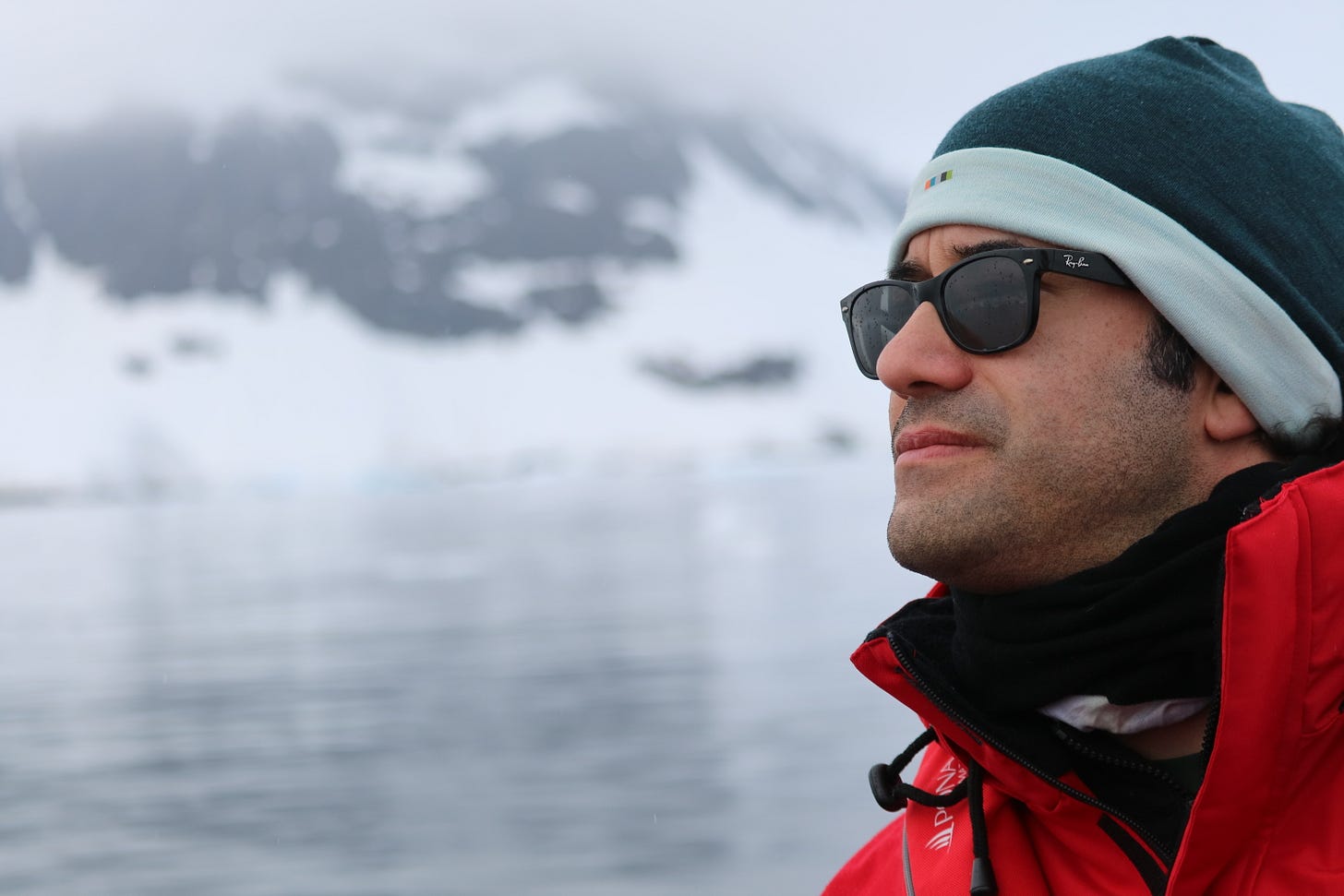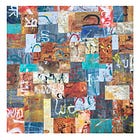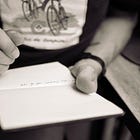Art and Mental Health Interview with Writer, Reader and Musician Alex Yalen
"Art is a direct connection to the beauty and the pain of human experience."
Hi Alex. Thanks for being here today.
Before we dig into the rich stuff, what's the first thing that you would like us to know about you by way of introduction?
In researching my spy novel work-in-progress, I came across a funny but profound idiom from the trenches of espionage: receive everything, transmit nothing. I'd never felt so understood.
What an interesting concept!
And yet you’re a writer, so you must be transmitting something. What’s your creative journey been like?
Well, I was never supposed to be an artist. I was supposed to be a white-collar professional something-or-other. Businessperson, professor -- something academic. I come from a highly academically gifted family. Even my writing was "supposed to be" nonfiction, reported, serious stuff -- not art, which, in my opinion, requires intense, unstructured time devoted purely to fantasy and play. I went back and read some poetry I wrote as an eight-year-old; I thought it ran circles around my essay-writing and journalism, my "sophisticated" work. Being creative to me means undoing about 30 years of white-collar austerity and supposedly useful "schooling."
I bet a lot of people can relate to that. I, myself, went to a semester or so of law school before realizing that’s definitely not the life I wanted. I learned that this isn’t uncommon; many would-be writers end up in law because they do well in that aspect of school. Then they graduate with law school loans and feel like they have to stay stuck in that field.
Okay, we’re going to get more into your writing and its relationship to mental health, so what would you like to share with us about your mental health experience?
Dealing with major depressive episodes is going to be a routine part of my life. It has cycles. When the depression is on, it is paralyzing.
Mine cycles as well. For a long time, I described it as recurring major depression, but more recently I’ve been understanding it more as double depression. I also find myself immobilized during the worst of it.
What has that experience been like for you?
When depression is "on," I find it impossible to do anything. I really hate every idea that comes out of my mind and hands.
When it's "off," I love nothing more than sitting in front of a blank page with no real objective other than to enjoy being in front of a blank page. I have an idea in my mind of maybe three, maybe ten, essential turning points or images... then I just "go."
It can be crippling. It can be amazing. It can be mundane, too.
Many people with depression experience low self-esteem and feelings of pointlessness/hopelessness which for me relates to that feeling of hating every idea you have.
I am really in the middle of wading through the relationship between depression and nihilism; is one the same as the other? Am I depressed or do I really live in a world of deceit all the way down? Is my subject matter depressing or is my subject matter the depression itself speaking by way of metaphor? What I think happens is that depression takes negative impulses and amplifies them about a million times. The world can feel incredibly monochromatic and just very, very heavy. I am sure I don't write noir by accident.
This that you just said resonates for me so much: “What I think happens is that depression takes negative impulses and amplifies them about a million times.”
You mentioned before that you were looking at poetry when you were 8. Would you say that you were always a writer?
I was reading by age 3. My family are all intensely excellent and sophisticated readers. Making my peace with my natural ability as a writer has been a wild and difficult journey, because I really have tried to do everything else other than write, and nothing has really stuck.
I love that you answered that first by talking about reading since naturally most writers are readers.
Who do you think it’s helpful to read?
Dostoyevsky and Tolstoy are everything.
So, it sounds like you have a complicated relationship with being a writer. How are you relating to that term these days?
Allowing myself to be something more than "a writer" has opened up a lot of things. I am an excellent bakery shift-leader. I love being out in the ocean. I'd love to figure out how to surf. I am an athlete. The best thing I've ever done for myself was understanding that I have more than one skill and it's more important to live in the world and try to understand it than it is to be some kind of "great artist" or whatever that even means. I have tremendous ambition, as I think most artists do, but getting away from an ego-driven externally motivated reward system has been absolutely essential to both my work and my own life. My creative ambition now is to put a totally true and honest and raw voice down on the page. Whether anyone "gets it"... who knows? Who can say?
I love that. And I think it ties in with how you succinctly describe yourself on Substack as a reader, writer and musician. Our different selves all come together all of the time.
What would you say is one key way that music intersects with writing for you?
I play guitar so I have a "tone," a "sound" in my mind of what the writing "sounds like," in sort of electric-guitar sound metaphors. "Clean" or "distorted" or "feedback" or whatever. Usually this involves listening to Hendrix or Gilmour, or things in the heavily electrified and very, very loud, jam-band style.
What is something that you struggle with as a writer?
Process-wise, one interesting hiccup I've discovered is how much I hate outlining -- I resent it, I resent how "professional" it feels, I resent having lots of apps to choose from to do my outlining -- the more like school writing it feels, the less I do. I have come to understand that the only way to make peace with "story structure" is to understand that my own internal compass will get me there, and what I really need is some daily amount of unstructured time to sort out my ideas. Now -- professionally speaking -- you *have* to turn out outlines and treatments. So... whatever. If money's involved, I'll do what I'm asked to do. But as a personal process... no.
What has your experience been working in groups with other artists/writers?
I don't have many artist friends, but I don't have a large number of friends, period. I'm trying to be more open with people, but it is much easier for me to write things down. I'd love to find a group of near-peer crime writers; I think our country needs millennial and Gen Z crime writers so badly... I want to boost work from people I admire. But I'm also not that social? Lol. Virtually everyone at my bakery is creative and hearing how they struggle and manage has been really interesting and it's helped me feel a lot less alone.
Art, whether shared with others directly or more indirectly, often helps many of us feel less alone.
How has art helped you most?
Art has helped me because it is an outlet to go where my mind needs to go. I really do feel that art uses me as much as I use it. I don't ever sit down and say, "I'm going to use my writing as therapy." I find that the key thing is for me to have no expectations about what my writing will look like or pull out of me. I need to find unstructured time and let my mind go, and that's when the therapeutic element kicks in on its own. I sometimes say it feels like "playing pretend" because I am an only child and I was a latchkey kid and a lonely latchkey kid at that. I spent many, many hours entertaining myself... and when my art is really "flowing," there is a similar feeling, like I'm playing a game internally.
In what ways have you seen art help others?
Everyone needs to be heard from, somehow. I've seen the quietest, most reticent people draw or paint with ferocity... it's amazing. It's a real honor to see someone else's work in progress. I don't know that this is answering your question exactly, because I'm not sure that I've ever seen art "help" someone, other than to see that this person has a gift, and it's really cool to see it.
There is kind of a magic that happens when creating and it’s always an honor to witness that for sure.
Art is complicated, though. In what ways has it been complicated or harmful for you?
Art has forced me into a direct confrontation with myself and I appreciate that.
Art is extremely complicated for me but I find that complexity to be really interesting and rich and when art feels like it sucks -- when I really hate what I'm doing -- I wonder "why." What's happening inside me that makes art suck, because art almost can't suck... the entire process is just fascinating to me, but that doesn't mean it is good or easy and it can feel very, very far from "theraputic," per se.
In your own words, what do you think is the relationship between art and mental health?
Consciousness is incredibly complex and art is an outlet for things that feel unspeakable or unsayable. I often wonder why capitalism needs "brand storytellers." My theory is that commerce coopts the language of art because we all know that commerce is artifice and art is truth. Art exists beyond market forces. Art is a direct connection to the beauty and the pain of human experience. I feel that not all psychology is literature, but all literature is psychology, and I'm going to make a big claim, but I feel that art *is* mental health.
If you read this far, perhaps you liked the work. The work does take work. It only continues with support, so please consider subscribing. My annual rate starts at $10 per year.





